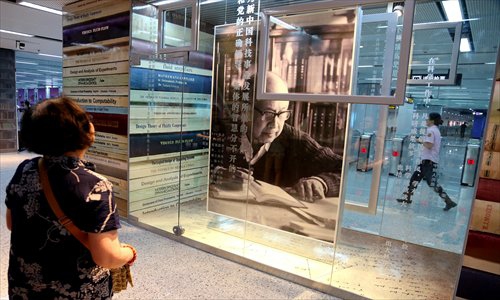Chinese netizens remember founder of China’s space industry Qian Xuesen for his tough journey back home from the US

A visitor looks at a section of Jiao Tong University Station on Line 11 in Shanghai that was decorated in honor of Qian Xuesen (1911-2009). File Photo: Yang Hui/GT
As China launched the Shenzhou-12 manned spacecraft to ferry three astronauts to the country's space station on Thursday morning, Chinese social media cheered the milestone in the history of the country's space program and remembered those who contributed to its success. One of those figures and the story of his tough and dangerous journey to return to the motherland from the US have gone viral among netizens.
That figure is Qian Xuesen, considered one of the founding fathers of China's space industry.
Qian has many titles, including mathematician and a physicist who made significant contributions to the field of aerodynamics and helped establish engineering cybernetics. Besides laying a foundation for China's space industry, he trained many aerospace talents who have grown into the backbones of the industry.
He also made great contributions to China's guided missile research and development.
One of the most impressive part of Qian's career for many Chinese netizens was how he overcame numerous roadblocks set in front of him by the US government before returning to his home country.
The hashtag "Qian Xuesen was detained by the US government and lost the ability to speak" has gone viral on China's Twitter-like Sina Weibo. What we know of now mainly came from Qian's wife Jiang Ying.
In 1950, Qian decided to resign from Caltech, where he was involved in rocket-related experiments at the Guggenheim Aeronautical Laboratory, and return to China. He broached the subject with then under-secretary of the Navy Dan A. Kimball, who told Qian that he would not be allowed to leave the US.
In an interview on China Central Television (CCTV), Jiang said that the US detained Qian on the groundless accusations that he had attempted to send secret documents to China in September 1950. Although his colleagues and teacher bailed him out of detention after 13 days, Qian's health had deteriorated due to the imprisonment.
"When he walked out of the jail, I told him that he could relax and that the children were fine. He just nodded and said nothing. Later I discovered that he had temporarily lost the ability to speak and had lost onepound a day during the imprisonment. In the end, he lost 13 pounds and was very weak," Jiang said.
Qian was placed under house arrest for the next five years and only returned to China in 1955 in an exchange for US pilots who had been captured in the Korean War.
Qian's experience touched many Chinese, including those with experience of studying abroad.
"I think Qian Xuesen insisted on returning to China regardless of how difficult the process was because he had firm belief in the motherland and a strong will to help the country become more powerful and prosperous," Fu Lin, a PhD student who studied in the UK for more than six years, told the Global Times on Wednesday.
After completing his studies, Fu also chose to return to China. She said she believes there are more opportunities to develop her career in China.
Many netizens saluted the senior scientists who dedicated themselves to the country, including Qian, meanwhile called on more young talents studying abroad to return to their motherland.
"Our country is rapidly developing and can also offer many opportunities. Young talents should see Qian as an example," one netizen commented on Sina Weibo.

